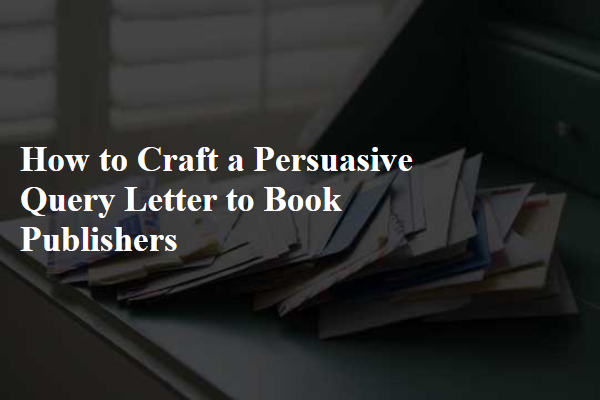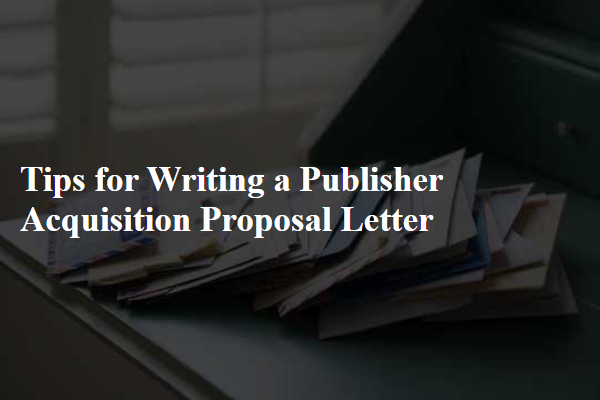
Craft a persuasive query letter to book publishers by clearly presenting your book's unique concept and target audience in a concise, engaging manner. Highlight your writing credentials and relevant experience to establish credibility, while maintaining a professional tone throughout. Tailor each letter to the specific publisher's guidelines and preferences to demonstrate research and genuine interest.
Understanding the Publisher's Requirements
| Step | Description |
|---|---|
| Research Target Publishers | Identify publishers matching your book's genre and submission guidelines. Use resources such as Publisher's Marketplace, literary agency websites, and WritersMarket to find the best fit. |
| Address the Right Person | Find the name and title of the editor or agent responsible for acquisitions. Personalized salutations increase credibility and show professionalism. |
| Craft a Compelling Opening | Begin with a hook that grabs attention. Include the book genre, word count, and a concise summary that highlights the unique selling points. |
| Summarize the Book Effectively | Provide a brief synopsis emphasizing plot, themes, and target audience. Focus on what makes your book marketable and distinctive. |
| Establish Author Credentials | Mention relevant writing credits, publishing experience, or subject matter expertise to build trust with the publisher. |
| Include a Call to Action | Request consideration for representation or publication. Invite the publisher to request the full manuscript or additional materials. |
| Maintain Professional Tone and Format | Keep the letter concise, error-free, and formatted to industry standards. Use a standard business letter layout and avoid informal language. |
| Proofread and Edit | Review for spelling, grammar, and clarity. Seek feedback from peers or professionals to polish the query letter before submission. |
Researching Your Target Audience
Crafting a persuasive query letter to book publishers requires clarity and professionalism. Begin with a compelling hook that summarizes your book's unique appeal in two to three sentences.
Introduce yourself briefly, highlighting relevant writing credentials or publishing credits. Clearly describe the book's genre, word count, and target audience to help publishers quickly assess its market potential.
Crafting a Compelling Hook
Crafting a persuasive query letter to book publishers involves clearly presenting your book's concept and your unique author credentials. The goal is to capture the editor's attention quickly and professionally.
Begin with a compelling hook that highlights the central theme or conflict of your book. Briefly summarize your manuscript's plot or key ideas while emphasizing what makes it stand out in the market. Conclude by specifying your target audience and expressing your willingness to provide a full manuscript or proposal upon request.
Showcasing Your Author Platform
What are the essential elements of a persuasive query letter to book publishers? Crafting a clear, concise, and compelling query letter increases your chances of capturing a publisher's interest. Highlight your book's unique concept and your credentials effectively.
How should you structure a query letter to appeal to book publishers? Begin with a strong hook that summarizes your book succinctly, followed by a brief description of the plot or content. Conclude with your author bio and a polite call to action.
Why is personalization important when sending a query letter to publishers? Tailoring your letter by researching the publisher's preferences shows professionalism and genuine interest. It demonstrates that your manuscript aligns with their publishing list.
What tone and style work best in a query letter for book publishers? Use a professional yet engaging tone, avoiding overly complex language. Maintain clarity and focus to make your letter easy to read and memorable.
How can you effectively present your manuscript's market potential in a query letter? Include relevant sales data, comparable titles, and target audience information to emphasize commercial viability. Providing these details helps publishers assess your book's appeal.
Presenting Your Book's Unique Selling Proposition
Crafting a persuasive query letter to book publishers is a crucial step in securing a publishing deal. This letter serves as your first impression, summarizing your manuscript's appeal and market potential.
- Research the Publisher - Understand the publisher's genre preferences and submission guidelines to tailor your query effectively.
- Write a Compelling Hook - Capture the editor's interest with a brief, engaging summary that highlights your book's unique premise.
- Showcase Your Credentials - Include relevant author background, previous publications, and any awards to establish credibility.
A well-structured, concise query letter increases the likelihood of your manuscript being noticed and considered by book publishers.
Structuring an Engaging Synopsis
Writing a persuasive query letter to book publishers is essential for capturing their interest and securing a book deal. A well-crafted query highlights your book's unique appeal and your credentials effectively.
- Research the Publisher - Understand the publisher's submission guidelines and the types of books they accept to tailor your query accordingly.
- Hook the Reader - Begin with a compelling hook that summarizes your book's genre, theme, and target audience in a captivating way.
- Showcase Your Credentials - Briefly present your writing background, relevant achievements, and any prior publications to establish credibility.
Demonstrating Market Awareness
Crafting a persuasive query letter to book publishers requires a clear, concise introduction of your book's unique concept and target audience. Highlight your writing credentials and any relevant publishing successes to establish credibility. End with a compelling call to action, inviting the publisher to request your manuscript for further evaluation.
Personalizing Each Query Letter
Crafting a persuasive query letter to book publishers requires a clear and concise introduction that captures the essence of your manuscript. Highlight the unique aspects of your story or concept while demonstrating your understanding of the target audience and market. Conclude with a professional closing, including your contact information and any publishing credits or relevant experience.
Mastering Professional Formatting
Crafting a persuasive query letter to book publishers begins with a clear, concise introduction of your manuscript. Highlight the genre, word count, and unique selling points to immediately capture the publisher's interest.
Summarize your book's plot or main argument in a compelling way, focusing on what makes it stand out in the market. Include a brief author bio that establishes your credibility and connection to the subject matter.
Following Submission Guidelines Precisely
Crafting a persuasive query letter to book publishers is essential for capturing their interest and securing a publishing deal. The letter must be clear, concise, and tailored to the specific publisher's preferences and guidelines.
- Research the Publisher - Identify the publisher's genres and submission requirements to personalize your query and increase its relevance.
- Write a Compelling Hook - Start with a strong opening sentence that summarizes your book's unique appeal and genre.
- Highlight Credentials and Manuscript Details - Briefly mention your writing background, word count, and why your manuscript is a good fit for the publisher.



Comments